Hillary Clinton's path to the nomination looks as secure as ever, but those who aren't already with her are growing more frustrated
Hillary Clinton continues her slow march to the Democratic nomination. But even though most supporters of Vermont Sen. Bernie Sanders admit she will likely be the Democratic nominee and could beat presumptive GOP candidate Donald Trump, half of them are as yet unwilling to support her in the fall.
The latest Economist/YouGov Poll shows Clinton back to a double-digit lead over Sanders among Democratic primary voters. That lead had been in single digits for the last two months – not since March has Clinton led Sanders by more than ten points.
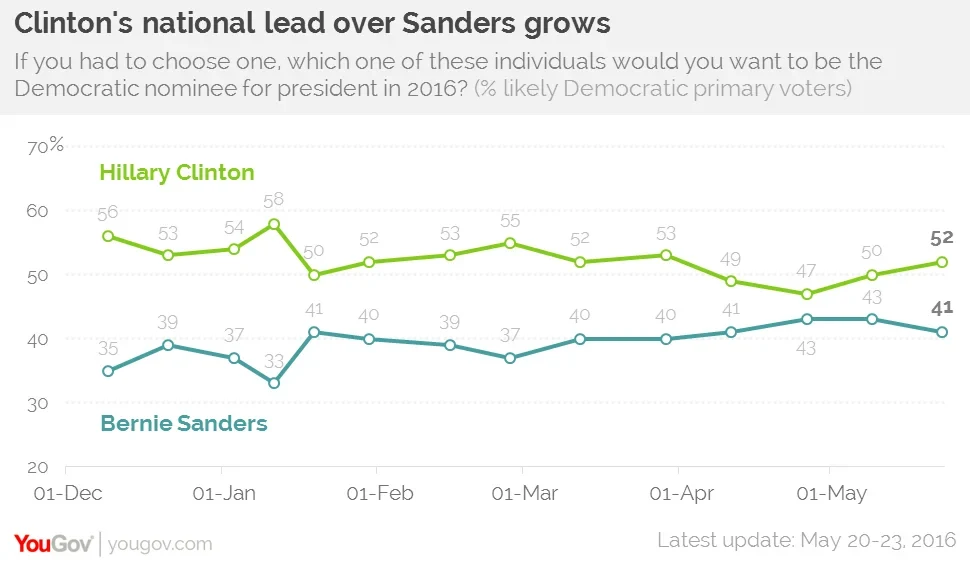
The combative Sanders campaign (on Tuesday they asked for a review of voting in Kentucky, looking possibly to add just a single delegate to their totals) isn’t necessarily getting a free pass from voters. Although many see possible favoritism towards Clinton in the Democratic rules and process, those who were aware of demonstrations by Sanders supporters at the Nevada State Convention two weekends ago (more than three-quarters of all Democratic voters) found them to be inappropriate. Even a quarter of current Sanders supporters agree.
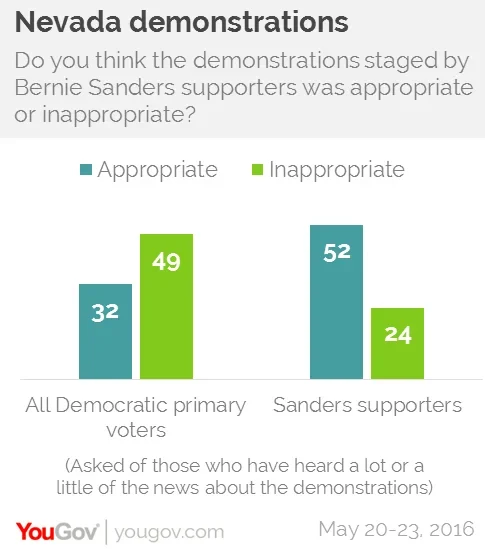
But many Democratic voters think Sanders may have a case. About half of Democratic voters think the Democratic National Committee is biased in favor of Clinton (78% of Sanders supporters believe the party’s process has been biased), even though many of those same voters understand that the rules were set up before any of the candidates announced.
But there is still confusion and division. A majority of Sanders supporters either have no idea when the rules were created, or think they were set up after Clinton decided to run for President. About half of all Democratic voters agree with Sanders’ statement about the Nevada event, and just about as many agree with the response by the DNC Chair, Representative Debbie Wasserman Schultz. Both quotes were presented to respondents without telling them who said them, but Clinton supporters and Sanders supporters had very different reactions to each statement.
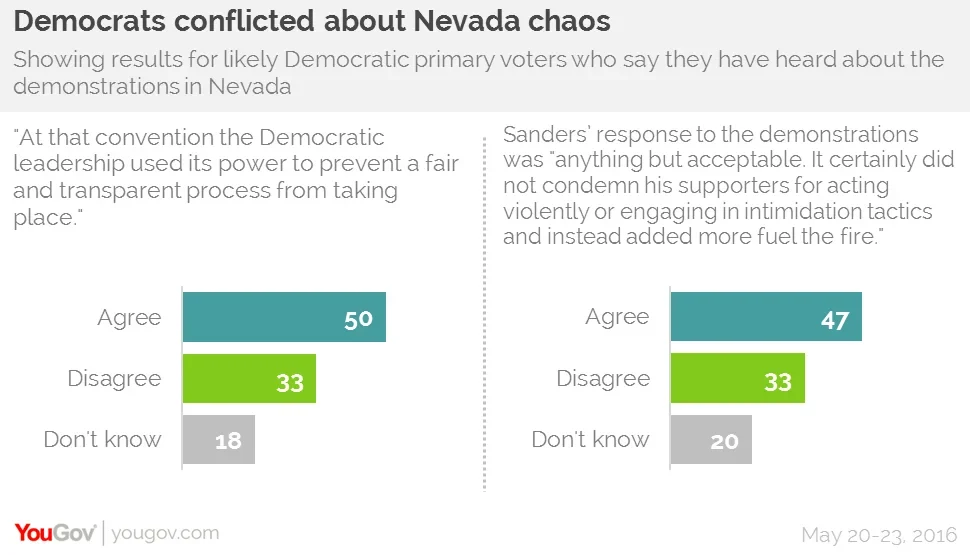
There is growing concern that the continuing Democratic campaign might be bad for the party, although just over half of Democratic voters think the longer campaign is a good thing. In the last two weeks, however, Clinton supporters have begun to worry: the percentage saying that the continuing campaign is good for the party has dropped eight points in the last two weeks, and more now say it’s bad for the party.
68% of Clinton supporters wish Sanders would leave the race, up seven points in the last two weeks. But most Democratic voters (including Clinton supporters) don’t believe there will be violent protests at the Democratic Convention in July. Clinton and Sanders supporters are in agreement on this.
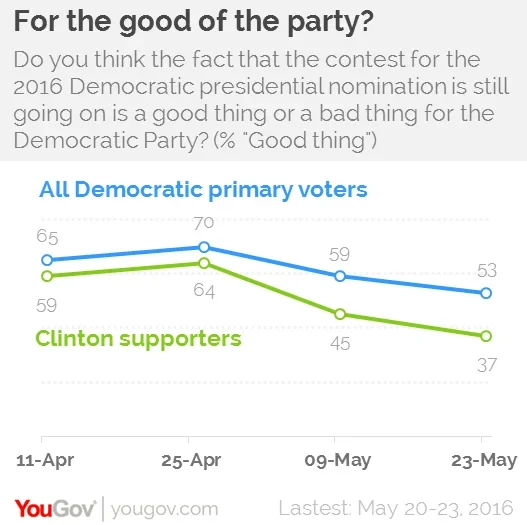
Democratic primary voters who favor Sanders are seeing the writing on the wall. More than half of them now believe Clinton will be the nominee. 68% of Sanders supporters think she can beat Donald Trump in the general election (only half of Clinton supporters believe Sanders could win).
But half of Sanders voters are not yet ready to support Clinton in a Clinton-Trump matchup. In fact, the percentage of Sanders supporters willing to vote for Clinton has dropped in the last few weeks. At the end of April, 63% of Sanders supporters said they would vote for Clinton. Importantly, however, these supporters are not going directly to Trump; instead they are moving into the undecided category, going for a third candidate, or opting out of the race altogether.
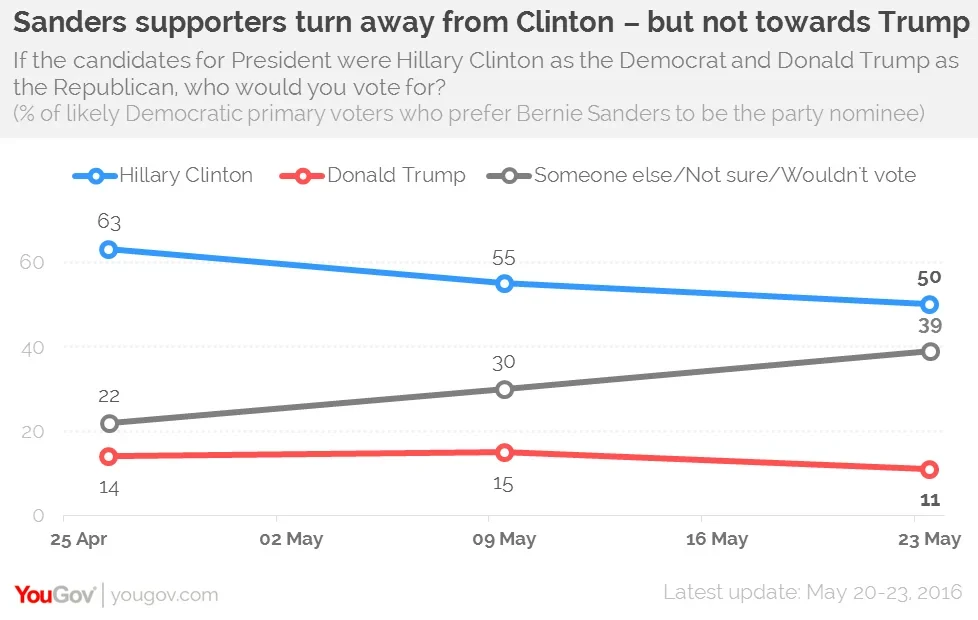
This lack of current support from fans of Clinton’s Democratic primary opponent is making the race with Trump appear very tight at this point in time. It is even tighter than the results of a question asking about whether registered voters would choose an unnamed Democrat or an unnamed Republican. And the Clinton-Trump pairing is also tighter than the Trump-Sanders contest – a point Sanders has been making.
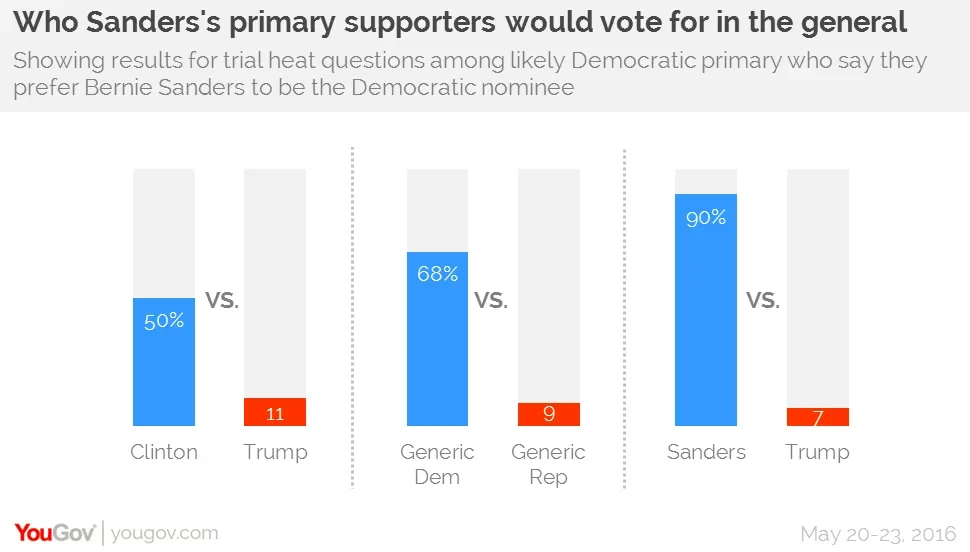
One of the reasons for the differences is apparent in the answers given by those Democratic primary voters supporting Sanders. Just half say they would vote for Clinton in the fall, while two in three say they will vote for the “Democrat.” As might be expected, nine in ten would vote for Sanders against Trump (perhaps surprisingly, 7% of Sanders supporters would vote for Trump even in Sanders were the Democratic nominee).
Clinton’s supporters are more likely to favor the Democrat, whomever it might be, or even if he or she is unnamed. More than nine in ten Clinton voters favor Clinton over Trump and would vote for the unnamed Democrat. Nearly eight in ten also would vote for Sanders if he were the nominee.
Of course, polls in May about a November contest – taken before either party’s candidate has been officially nominated and while there is still a spirited contest on one side – don’t necessarily reflect the fall outcome. There is a long way to go between now and then, and there may be party healing on both sides.
See the Economist/YouGov results
Economist/YouGov poll archives can be found here.








